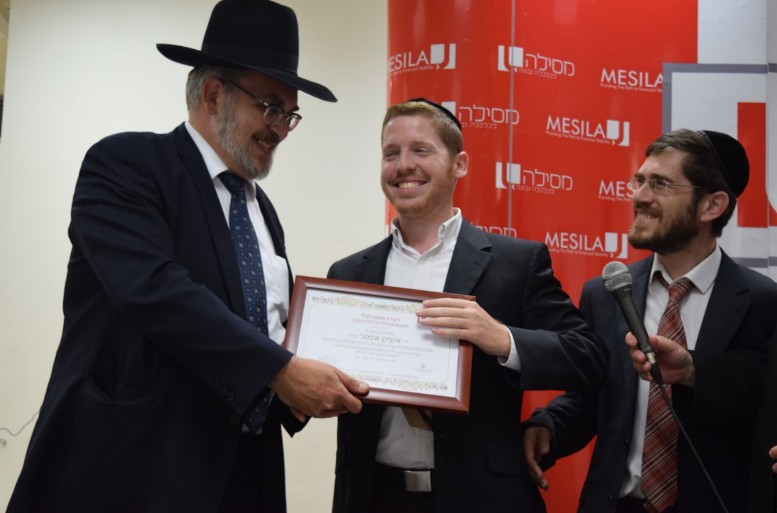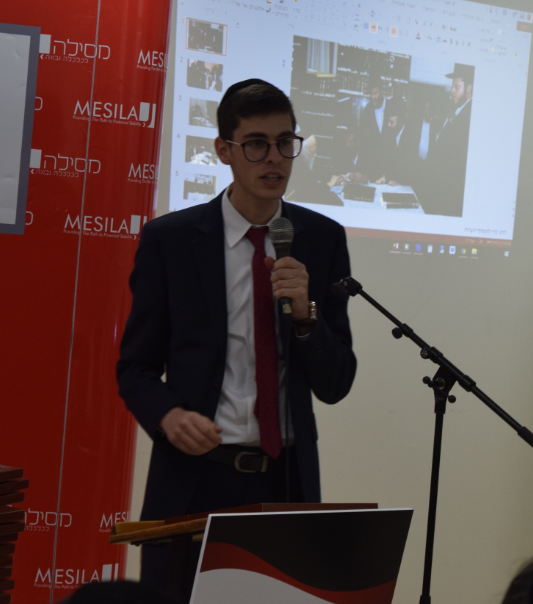Rabbi Yisrael Gutman: "Without a Sense of Mission, No One Becomes a Family Financial Advisor"
Rabbi Yisrael Gutman, head of the Family Economy Department at the 'Mesila' organization, has encountered many families desperate about their financial situations. The economic guidance process, he asserts, succeeds in over ninety percent of cases in setting them on the right path. What are the common financial mistakes that families make, how much money does a family need to live with dignity, and how do they prepare for the expenses of a child's wedding? A special interview.
 Rabbi Yisrael Gutman
Rabbi Yisrael GutmanA few weeks ago, a financial advisor from the 'Mesila' organization sat with an Orthodox couple who had fallen into debt. After systematically summarizing the family's fixed income and expenses, the advisor asked the couple what they thought could be done to improve the situation.
"Stop eating and drinking," the woman replied.
"This was their first meeting with our advisor," Rabbi Yisrael Gutman, who heads the Family Economy Department at the Mesila organization, says. "And they were full of despair."
Rabbi Gutman has seen many people despair over their financial state during his years of activity in the Mesila organization. 'Mesila' started 17 years ago and was then called "Debt Arrangement Fund," an organization aimed at helping families entangled in debts by arranging their debt repayment plans. But after a few years, the organization's people concluded that it was an endless pit. Assisting with loan repayments without teaching the family to manage otherwise was doomed to fail. The organization changed its name to 'Mesila' and began focusing on household economics, conducting workshops and lectures throughout the country, and even providing private family guidance.

Rabbi Yisrael Gutman worked as a financial advisor with Mesila since its early years, but in recent years he simultaneously managed an organization called 'Balances'. "Through Balances, I guided families using a different method than Mesila: not just advising on saving and cutting expenses but also coaching. A combination of financial advice and economic coaching, following a model that aimed less at telling the family what to do and more at working from their mindset to help them find the solutions themselves."
About three years ago, Rabbi Gutman was appointed in charge of the household economy field at Mesila and imported the 'Balances' model there. If once Mesila's financial guidance focused on convincing to get rid of credit cards, recommending the postal bank, and detailed tables of expenses and income, today it includes much more than that.
"We trained dozens of new advisors according to the new model, and we started working much more professionally. We have very organized follow-up and control over our work, and so we know that we have around 90 percent success rates of families reaching tranquility, with an organized financial plan and a monthly difference of 2000-3000 shekels compared to what they had before."
On the other hand, you raised the price of the financial guidance you provide to families.
"True. We raised the amount to 900 shekels for a guidance process that includes six meetings, which is still very low compared to what commercial entities offer. We demand a lot from our advisors: they undergo comprehensive training, they are required to fill in reports and submit summaries for every one-hour meeting... Even though they are compensated a bit more today, without a sense of mission, no one arrives at this role, which really demands a lot."
 (Photo: shutterstock)
(Photo: shutterstock)The families seeking guidance, Rabbi Gutman says, mostly come from the 'friend brings a friend' method – although there are also families referred through charity organizations that cooperate with Mesila, such as the Bnei Brak municipal fund.
What causes families to approach you?
"Usually not big catastrophes... Sixty percent of the families approaching us aren't families with big debts, but they simply feel they are not managing well."
There are more than fifty common economic mistakes families make, Rabbi Gutman says, but one of the particularly common mistakes is the tendency to treat expected expenses as something sudden. "People tell me: 'Suddenly my wife gave birth', 'Suddenly I had a bar mitzvah'. They had time to prepare for these events, after all... or families on whom fixed annual expenses fall unexpectedly every year. I always remind people that in the next fifty years Pesach will come, and there's no reason not to prepare accordingly. Ideally, one should always set aside money for big annual expenses or unforeseen circumstances."

Another error he lists is treating debts as income. "For many people, in their subconscious, the overdraft, or the credit provided by the card, is considered part of the income. For some, even a loan from a charity fund counts as income... It requires a shift in perception to understand that expenses must come from income."
What happens to a financially calculated family that faces a truly unavoidable large expense, like a child's wedding?
"From our experience, those who managed well until the children's wedding, the financial expenses of the wedding won't break them. Even if they mortgage the house or take a loan, it will be done in an orderly and responsible manner, with control as they always operate. The big problem is for those who haven't managed financially until today, and then reach their children's marriage."
"People are not aware of their real income and expenses"
What actually happens in the guidance process? Rabbi Gutman explains that the advisor sits with the couple and explains what 'Mesila' can assist them with. "We always strive to sit with both partners, because real change can only be made in cooperation. We always tell those who ask: 'If there's a partner who doesn't earn or spend, they don't need to come to the meeting'."
"In the second stage, they check options to reduce expenses or increase income. The family chooses the path that seems most suitable to them. We certainly don't make decisions for them."
'Increasing income' sounds much easier than it is in practice...
"People really tend to despair initially and think there is no solution, like in the story about the couple we opened with. The woman truly believed they would have to starve to get out of the financial hole they found themselves in... but the advisor sat with them exactly on the additional income they needed, and lo and behold – by the third meeting the husband already managed to add 3,900 shekels to the monthly income through new sideline work..."
If people can arrive at economic solutions on their own, why do they need the guidance process?
"People are not truly aware of how much they earn and how much they spend. Once you sit with them and show them the numbers – exactly how much they need to increase income or reduce expenses – it gives them the strength to change and propels them forward. Additionally, the guidance helps them build priorities: according to their own value scale, not the advisor's."

From your vast experience, how much money does a Haredi family need to live with dignity?
"From my work experience with over 1,300 families, just the grocery expenses are between 80 to 150 shekels per person per week. The official data, which is correct according to our experience, is 1500-2000 shekels per person per month, excluding mortgage and rent which cost over a thousand shekels a month."
According to the official data, Haredi families are much poorer...
"The official data don't always know how to assess the state of the Haredi sector. I sat in a discussion in Jerusalem where official data was quoted saying Romema is one of the poorest neighborhoods in Jerusalem... how did they arrive at this? Well, many American couples live there, where the father is a Torah scholar and the mother is not working. Therefore, they don't pay taxes and according to the Central Bureau of Statistics they are extremely poor. What is missing from the picture is the fact that they have parents abroad who support them financially with a wide hand, so they are actually far from poor. Income is not only from work profit: it also includes support from parents, stipends from yeshivas, allowances, shopping vouchers, and so on."
In conclusion, Rabbi Gutman wishes to emphasize: "Our role at Mesila is to provide the family with the most powerful tools and always remember that we are making our effort while praying that this is the right effort to bring us peace and calm in household finances."
For free family economy tools, listen to 'Mesila's lecture line: 02-80-30-222

